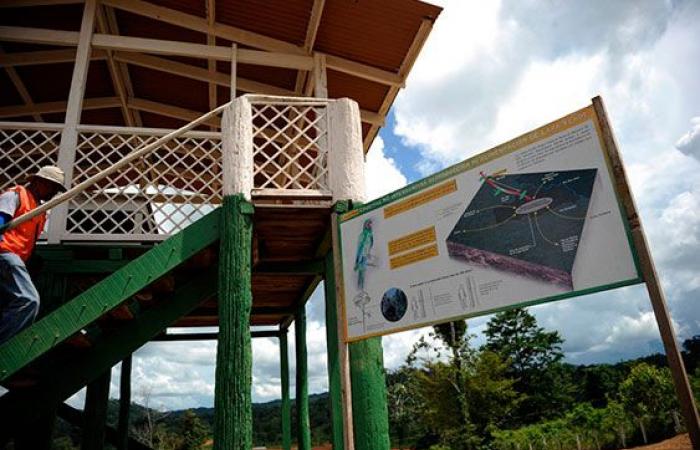According to information provided by CIARGlobal’s specialized site on investment arbitration (see note), the Canadian mining company Infinito Gold seems to be withdrawing from the case in the pending procedure before the International Center for Settlement of Disputes between Foreign Investor and State (ICSID) against Costa Rica.
The use of the conditional is due to the fact that, at least officially, nothing has emerged from the ICSID, nor from the Costa Rican foreign trade authorities, in charge of Costa Rica’s defense before the ICSID.
Brief context
As will be remembered, on June 4, 2021, the ICSID released an arbitration award partially favorable to Costa Rica (see text) in response to the lawsuit filed by the Canadian mining company Infinito Gold in February 2014.
This award was the subject of a request for partial annulment by the Canadian mining company in October 2021, which we had the opportunity to analyze in a previous note when the arbitration panel was established in the first days of 2022: see our note titled «Infinito Gold vs. Costa Rica: formation of an ICSID Committee to examine the request for annulment of the arbitration award presented by the mining company» from January 18, 2022.
Demonstrations against the Crucitas mining project in Costa Rica. Image taken from the article titled “Canadian groups tell gold company to ‘stop harassing’ Costa Ricans” (Bilaterals.org., April 17, 2013 edition).
Of some details
There is still no official confirmation from ICSID since it is only specified in the procedural details of the case available on its official website (see link) that:
| June 14, 2024 | The parties file a request for the discontinuance of the proceeding pursuant to ICSID Arbitration Rules 53 and 43(1). |
If, as indicated, both parties (Infinito Gold and Costa Rica) have requested that the case be subject to some type of suspension or if the company has definitively decided to withdraw, this should be confirmed in some official decision, which for the moment it is unknown. Since the Infinito Gold company has not had offices in Costa Rica for many years, there is no way to request any confirmation in this regard.
In Costa Rica, the authorities have not made public any announcement in this regard.
It is noteworthy that Articles 53 and 43(1) cited on the official ICSID website … are not provisions that apply to the situation indicated, which raises very valid questions (see text).
If both parties have requested that the matter be discontinued, it is article 55 that finds application and not the aforementioned provisions 53 and 43(1):
«Rule 55 Compromise and Discontinuation by Agreement of the Parties:
(1) If the parties notify the Court that they have agreed to discontinue the proceedings, the Court will issue a resolution recording the discontinuation.
(2) If the parties agree to settle the dispute before the award is issued, the Tribunal: (a) must issue a resolution recording the discontinuation of the proceedings, if the parties so request; or (b) may incorporate the agreement in the form of an award, if the parties present the complete and signed text of their agreement and request the Court to incorporate said agreement in an award.
(3) The Secretary-General shall issue the resolution referred to in paragraphs (1) and (2)(a) if the Tribunal has not yet been constituted or if there is a vacancy in the Tribunal.
For some reason (which would be of great interest to know), ICSID on its official website refers to provisions that are not applicable to the present case.
Some brief reflections
The lack of transparency of the ICSID constitutes one of the main reasons why many States maintain their distance from the investment arbitration system it provides, and it is confirmed again in this precise case: to date, the terms of the agreement are unknown. request for partial annulment of the award of June 4, 2021 presented by the Canadian mining company in October 2021, as well as the written pieces containing the allegations of the Canadian mining company and Costa Rica.
In recent decades, the ICSID has aroused many reservations in various circles in Latin America but also in other latitudes, due to the lack of transparency in its procedures, the profile of its arbitrators (many times unfamiliar with critical legal issues such as the protection of environment, the right to water and the rights of indigenous populations, administrative and constitutional law), as well as the million-dollar and sometimes disproportionate amounts to which States have been condemned in some cases, for clearly abusive demands from a foreign investor (Note 1). It is worth mentioning that when ICSID was created in 1965, the idea was to allow an investor to recover the amount of his initial investment subject, for example, to a nationalization decree, and not to add to this amount other additional amounts corresponding to the future profits projected by the foreign investor not received (Note 2).
We had the opportunity to analyze the denunciation by Honduras of the Washington Convention that created the ICSID in March 2022, which is added to the previous denunciations by Bolivia, Ecuador and Venezuela: see our brief note titled «ICSID: regarding the recent denunciation by Honduras of the 1965 Washington Convention«.
In conclusion
If it were not for the aforementioned note from CIARGlobal, no new information on the development of this long controversy before the ICSID of Costa Rica related to the mining project located in «The Crucitas«, could be made known.
Let us remember that it was a mining project located in the Northern Zone of Costa Rica, and that it intended to be the largest in Central America. This project, run by the Canadian mining company Infinito Gold, was declared without consultation by decree «of national convenience» in October 2008, and its total illegality was ruled in November 2010 by three courageous judges of the Administrative Litigation Court (TCA): the reading of their sentence (see text complete) deserves a rereading given the attempts at deregulation in environmental matters that have been discussed in recent months in Costa Rica.
In November 2011 this decision was confirmed by the First Chamber of the Supreme Court of Justice (see text). In February 2014, a few days after the election results in Costa Rica were known, the Canadian mining company found nothing better than to sue Costa Rica before the ICSID.
In November 2023, we had the opportunity to analyze the declaration of unconstitutionality of a mining contract in Panama with a Canadian mining company, which sent Panamanians, as rarely done, to mobilize in the streets for several months: see our note titled «Regarding the declaration of unconstitutionality by the Supreme Court of Justice of Panama of a mining contract law«.
Regarding Canadian mining companies and Canada as such, since 2014, a report on the negative impact of Canadian mining companies in Latin America expects Canadian authorities to take actions to regulate their activities from Canada, in particular from the perspective of human rights and environmental protection (Note 3).
– – Grades – –
Note 1: On the various strategies of the States of the Latin American region to limit the scope of certain treaties with clauses that are extremely favorable to foreign investors, see the detailed analysis by Professor Katia Fach Gomez: FACH GOMEZ K., “Proposing a conciliatory decalogue for Latin America and ICSID”, Faculty of Law and Political Sciences Magazine (Medellín, Colombia), Vol. 40 (Dec. 2010), No. 113, pp. 439-454, article available here. See also the publication FACH K & TITI C. «The Latin American Challenge to the Current System of Investor-State Dispute Settlement«, Journal of World Investment & Trade 17, 2016, pages 511-699. As well as FACH GOMEZ K. & TITI C., Alternative Dispute Resolution Mechanisms, Oxford University Press, Oxford, 2018, 800 pages. On the review carried out by Indonesia of more than 50 BITs signed, see in particular this very detailed study of HAMZAH, LAMPUNG University, «Bilateral Investment Treaties (BITS) in Indonesia: a paradigm, shift, issued and challenges«, Journal of Legal, Ethical and Regulatory IssuesVolume 21, Issue 1, 2018. Full text available here.
Note 2: About the negative effects on the economies of the Latin American States of these millionaire amounts ruled by the ICSID arbitrators and that were consolidated with the network of BITs adopted enthusiastically – and in our modest somewhat naive opinion – in the years 90-2000, we refer to the very complete article by ZABALO P.“Latin America and the investor-state demands“, World Economy Magazine, No. 31 (May-August, 2012), pp. 261-296. Text available here.
Note 3: See in this regard the report entitled » The impact of Canadian mining in Latin America and Canada’s responsibility – Report presented to the Inter-American Commission on Human Rights«, Working Group on Mining and Human Rights in Latin America, 2014. Full text available here.
Nicolas Boeglin, Professor of Public International Law, Faculty of Law, University of Costa Rica (UCR)






